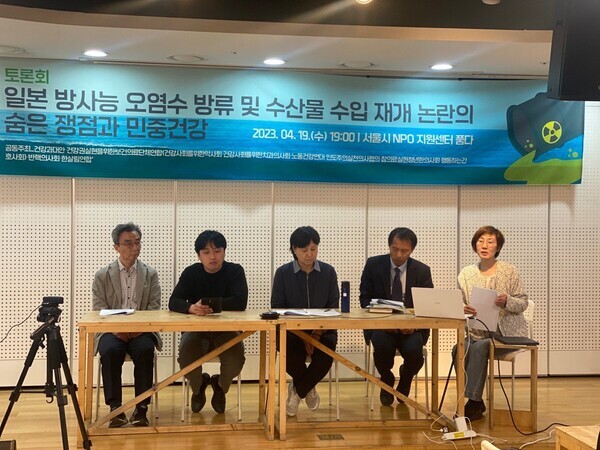hankyoreh
Links to other country sites 다른 나라 사이트 링크
As dumping nears, Koreans worry about health hazards of Fukushima wastewater

With the clock ticking down on the Japanese government’s plan to dump radioactively contaminated water from the Fukushima Daiichi nuclear power plant into the sea this summer, Koreans are voicing concerns about how the discharge of water will affect people’s health.
“As a peninsula, South Korea is surrounded by the sea on three sides. Many lives depend on the sea for their livelihoods,” said Lim Mi-hwa, head of the environmental subcommittee of the Hansalim co-op in Busan. “The discharge of contaminated water from Fukushima is a disaster that threatens their health and survival and deprives the future generations of the sea.”
Lim’s comments came during a discussion that took place under the title “People’s Health and the Hidden Issues of Japan’s Discharge of Radioactive Contaminated Water and Resumption of Seafood Imports,” organized by the Center for Health and Social Change and a coalition of medical groups for health rights at the Seoul NPO Support Center in central Seoul on Wednesday.
“Various radioactive substances will accumulate in sea life and migrate to our waters,” Lim said. She criticized the government, saying, “The damage caused is a serious threat to fishermen’s livelihood and people’s safety, but the Korean government has remained silent.”
Those in the fishing business also voiced concern about possible food safety incidents caused by radioactive material.
Choi Ji-min, head of Hansalim’s agricultural, forest, and fisheries department, remarked, “If physical hazards such as metals are found in food, we can collect or discard them, and if chemical hazards such as food poisoning are found, we can improve the overall hygiene management system of the workplace.”
“However, if contaminated water from Japan’s nuclear power plants is discharged into the sea, and food safety incidents are caused by seafood with accumulated radioactive substances, how do we go about remedying this?” Kim asked.
“If contaminated water is released, seafood will be perceived as unsafe to eat, and producers will be hit hard,” he added.
There were also rebuttals to the claims saying that the contaminated water would be harmless to humans, as the impact of the discharge is due to low-dose radiation, which some experts say is harmless to humans.
Paek Do-myung, professor emeritus at Seoul National University’s Graduate School of Environment, said, “The effects of low-dose exposure are specifically confirmed at a statistically significant level through epidemiological studies. The effects of low-dose exposure should not be dismissed as non-existent or unmeasured.”
Paek pointed out that the most serious effects are caused by the radioactive substance tritium, which is absorbed by DNA and stays in the body.
By Kim Yoon-ju, staff reporter
Please direct questions or comments to [english@hani.co.kr]

Editorial・opinion
![[Column] The state is back — but is it in business? [Column] The state is back — but is it in business?](https://flexible.img.hani.co.kr/flexible/normal/500/300/imgdb/original/2024/0506/8217149564092725.jpg) [Column] The state is back — but is it in business?
[Column] The state is back — but is it in business?![[Column] Life on our Trisolaris [Column] Life on our Trisolaris](https://flexible.img.hani.co.kr/flexible/normal/500/300/imgdb/original/2024/0505/4817148682278544.jpg) [Column] Life on our Trisolaris
[Column] Life on our Trisolaris- [Editorial] Penalties for airing allegations against Korea’s first lady endanger free press
- [Editorial] Yoon must halt procurement of SM-3 interceptor missiles
- [Guest essay] Maybe Korea’s rapid population decline is an opportunity, not a crisis
- [Column] Can Yoon steer diplomacy with Russia, China back on track?
- [Column] Season 2 of special prosecutor probe may be coming to Korea soon
- [Column] Park Geun-hye déjà vu in Yoon Suk-yeol
- [Editorial] New weight of N. Korea’s nuclear threats makes dialogue all the more urgent
- [Guest essay] The real reason Korea’s new right wants to dub Rhee a founding father
Most viewed articles
- 1[Column] Why Korea’s hard right is fated to lose
- 2Amid US-China clash, Korea must remember its failures in the 19th century, advises scholar
- 360% of young Koreans see no need to have kids after marriage
- 4[Column] The state is back — but is it in business?
- 5Presidential office warns of veto in response to opposition passing special counsel probe act
- 6OECD upgrades Korea’s growth forecast from 2.2% to 2.6%
- 7Hybe-Ador dispute shines light on pervasive issues behind K-pop’s tidy facade
- 8Inside the law for a special counsel probe over a Korean Marine’s death
- 9Japan says it’s not pressuring Naver to sell Line, but Korean insiders say otherwise
- 10[Editorial] Stagnant youth employment poses serious issues for Korea’s future